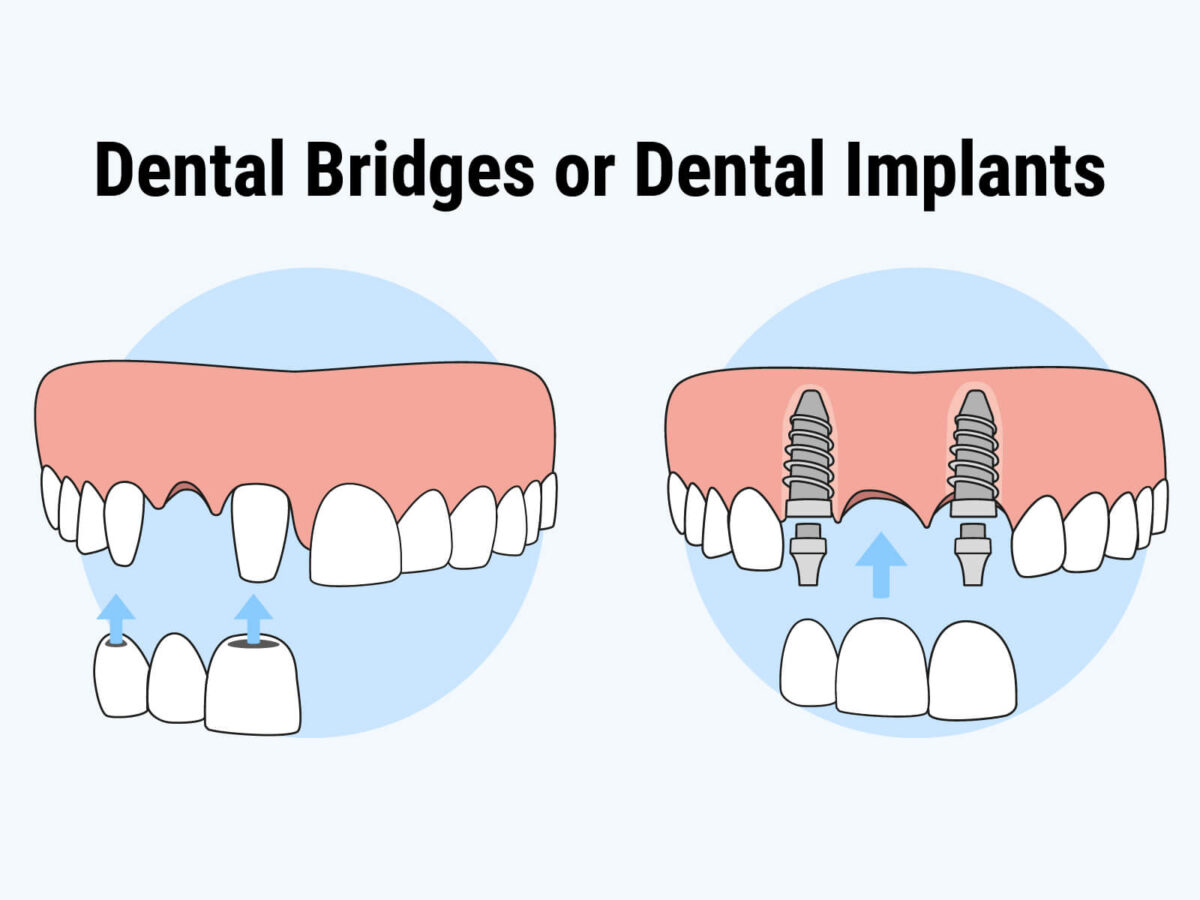River Walk Dental Orthodontics
Blog
Dental hygiene tips for healthy teeth & gums

Dental Implants or Bridges: Which Is The Better Choice
American College Of Prosthodontics highlights that more than 36 million Americans have no teeth, while 120 million Americans are missing at least one tooth. Surprising, right?
Tooth loss comes about as a result of various reasons such as aging, injury, and decay. When it comes to replacing a tooth, there are two major options dental implants and bridges. Nonetheless, both options have their benefits. But how can you tell which option best suits you? Let’s concentrate on the valuable information in this blog that is needed to make an informed decision.
Dental Implants
Many patients at San Antonio Dental Office TX prefer dental implants. These comprise titanium posts installed into the jawbone by surgery to form a strong base for an artificial tooth or crown.
Longevity is one of the key merits of dental implants, which, if properly taken care of, can last forever. Also, they prevent the collapse of your jawbone structure, which happens when somebody loses teeth; hence, they preserve your facial structure. Are you wondering whether having an implant is painful? Most people report little pain during this procedure due to the use of local anesthesia.
Dental Bridges
Bridges are another common way to deal with missing teeth. A bridge usually has two crowns supporting it from either side of the gap with a false tooth in the middle. This choice is particularly preferred by individuals with weak bone density who cannot undergo implantation.
An advantage that bridges possess over dental implants is that they do not require any surgical incisions, which makes them less invasive than implants. They are also cheaper than implants and only take a few visits to your San Antonio Dentist T, X to complete. Conversely, bridges need replacement after several years, and they cannot conserve jawbone like implants do.
Comparing Cost and Time Commitment
- Cost – Generally speaking, dental implantation costs more upfront because it includes surgery costs plus expensive materials used in construction; nevertheless, looking at its durability makes it cheaper eventually.
- Time Commitment – In most cases, dental implantation is time-consuming and lasts several months. This involves a healing period after which the implant bonds with the jawbone. At the same time, bridges can be done in a few weeks.
It is important to consider all these factors in your budget and schedule. Would you prefer a quick solution, or are you ready to spend more time and money on a longer-lasting result?
Maintenance and Care
Knowing the right tooth replacement options and their respective care is crucial for their longevity and effectiveness.
Dental Implants:
- Clean them frequently like any other natural teeth.
- Go for regular checks at the San Antonio Dental Office TX to keep the implant healthy.
Dental Bridges:
- There are special floss threaders underneath the bridge that need cleaning.
- Do not consume hard or sticky edibles as they may damage it.
Dental implants are easier to maintain because they resemble natural teeth more than bridges. Thus, requiring only ordinary oral hygiene procedures.
The Aesthetic and Functional Considerations
Aesthetics and functionality are the main factors to consider when one is choosing between dental implants and bridges.
- Aesthetics: When it comes to aesthetics, dental implants look more natural compared to bridges. Being similar in appearance and texture to your real teeth, they make an outstanding alternative for those worried about their looks.
- Functionality: Implants are stable and allow for normal chewing and speaking without any discomfort. While functional, bridges may not feel as natural, and over time, the teeth supporting the bridge could weaken.
Functionality and aesthetics are crucial considerations, especially if you’re looking for a seamless dental restoration solution.
Recognizing the Effect on Dental Health
It’s important to take your oral health’s long-term consequences into account while choosing between dental bridges and implants. In addition to providing a strong base for prosthetic teeth, dental implants stimulate the jawbone, halting the gradual loss of bone. This stimulation is necessary because, in the absence of it, the bone around the missing tooth may slowly degrade, giving the impression of a sunken face and perhaps causing problems with neighboring teeth.
However, even if dental bridges are a faster fix, the jawbone does not get the same amount of support from them. Since bridges depend on the neighboring teeth for support, they may exacerbate their deterioration. Future dental issues like gum disease or tooth decay may result from this, particularly if the bridge is not taken care of correctly.
Carefully evaluating your existing dental health and any possible future problems is necessary for both choices. Oral implants could be a preferable option if maintaining the integrity of the jawbone and general oral health are important considerations. Nonetheless, a dental bridge can be a good choice for you if you’re prepared to accept the risks and are searching for a less intrusive procedure with a quicker recovery period. You may assess which option is ideal for your long-term dental health by speaking with your San Antonio dentist TX.
Conclusion: Making the Right Choice
Deciding between dental implants and bridges can be challenging, but it ultimately comes down to your specific needs and preferences. Dental implants offer a permanent, natural-looking solution that supports jaw health, while bridges provide a quicker, less invasive, and more affordable alternative. A San Antonio Dentist TX, can help you weigh the pros and cons of each option based on your oral health and personal goals.
Remember, whether you choose dental implants or bridges, regular visits to a certified San Antonio Dental Office TX are essential to retain your dental restoration treatment and overall oral health. So, what’s the best choice for you? By considering your lifestyle, budget, and long-term goals, you’ll be able to make an informed decision that keeps your smile healthy and vibrant for years to come.
